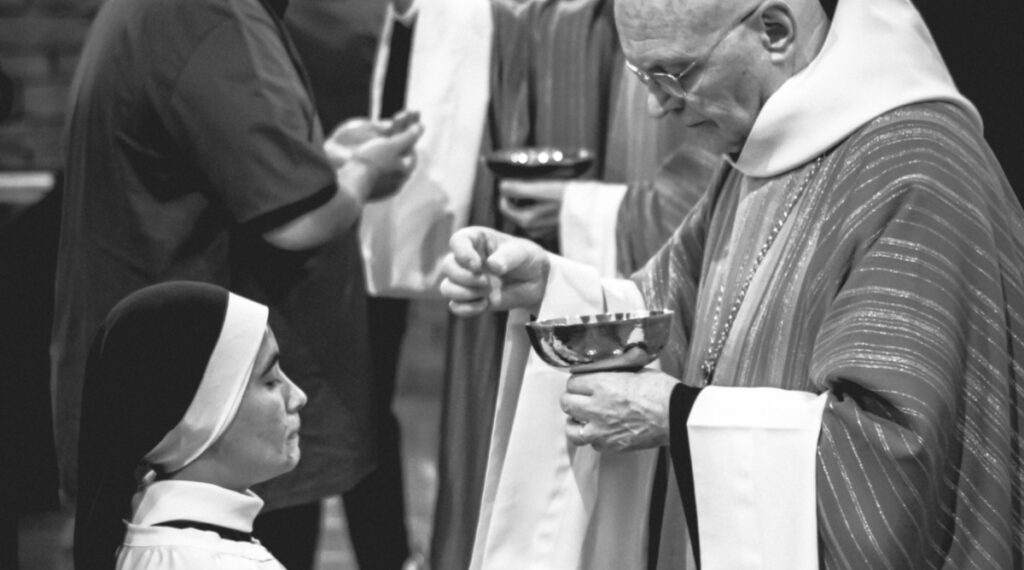Editor’s note: This is part 27 of a series, “The Kingdom of Grace.” Part 26 can be found here.
Holy communion works many and wonderful effects in us, but the spiritual dispositions with which we receive the sacrament makes a difference in the effects. Certain spiritual dispositions open us more fully to its immense working power of the Eucharist. This point needs some explanation.
When the flame of a burning match touches dry paper, the paper catches on fire easily and burns very quickly. When the same flame touches damp paper, the paper might catch on fire just barely and burn rather slowly or just smolder. When the flame touches saturated paper, the paper does not catch on fire at all or even smolder very much. In all three cases, the cause is the same – the same flame. The effects that flow from the flame, however, are conditioned by the state of the paper.
So, too, it is with holy communion and our souls. To receive holy Communion is to be touched with the flame of eternal Love. Yet, the state of our souls at the moment of reception conditions The Effects of Holy Communion on us. Certain qualities of mind and heart, sometimes called subjective dispositions or spiritual dispositions, are more suitable than others for receiving the many and wonderful effects of the sacrament. When we have the proper dispositions, the effects of holy communion go deeper, run stronger, and endure longer in us than when we lack the proper dispositions. What, however, are the proper dispositions?
The first and most minimal condition is to be in a state of grace. Saint Paul says “everyone ought to examine themselves before they eat of the bread and drink from the cup” (1 Cor. 11:28). Those who eat and drink in a state of serious sin, without first repenting of their sins, not only commit the sin of sacrilege but endanger their own souls still further. When received in such a state – a state of serious sin without repentance – holy communion actually has the opposite effect of sanctification. It results in further loss of respect for holy things and perhaps eventually even the loss of faith altogether. It is “why many of you are weak and sick and a number of you have fallen asleep” (1 Cor. 11:30). The most ancient liturgy on record summed up the situation simply: “If any man be holy, let him come. If any man be not, let him repent.” (Didache, 10:6). The Church still teaches the same thing today but with greater clarity about the need for recourse to the sacrament of penance. “Anyone conscious of a grave sin must receive the sacrament of Reconciliation before coming to communion” (CCC 1385).
To be in a state of grace is the minimal disposition necessary to receive holy communion, but when it comes to receiving Love why would anyone settle for the minimum? Further more specific dispositions open us to receive more fully the effects of holy communion.
We need faith in the Eucharist. Faith in the real presence brings us under the influence of Jesus Christ’s working power in the sacrament. It is good to recall often, but especially in preparation before Mass, how the appearances of bread and wine are merely appearances. In reality, the sacrament is truly the body and blood of Jesus Christ himself. In this sacrament, God himself comes to us in love and floods us with his grace.
We need humility before the Eucharist. Holy communion is not something owed to us as a matter of natural justice, but is an undeserved supernatural gift – a grace. At the Last Supper, Peter was surprised when Jesus stooped down to wash his feet. In every Mass, however, the eternal Son of God does something more astonishing still. He stoops down to feed us with his own body, blood, soul, and divinity – his very Life – in the Eucharist. Who can fathom being served by God? Who can say he or she deserves such Love as this?
We need confidence in the Eucharist. Confidence consists of counting on God for good things to come. In every holy communion, many good things are coming to us. Many graces. God alone knows what graces he will bestow upon each of us in each holy communion. Each and every one of those graces is particularly adapted to our personal needs according to God’s eternal designs for our lives. When we approach with confidence in the Eucharist and the mighty working power of the sacrament, then we are free to forget ourselves, our plans to perfect ourselves, and our weaknesses and imperfections too. Growing in holiness is not about us. It is on Him.
We need desire for the Eucharist. Friends desire to eat together and to be together. So it is with the Lord Jesus. “With desire have I desired to eat this pasch with you” (Lk. 22:15). Knowing by faith his desire to eat with us and to be with us, the only appropriate response is to desire to eat with him, to be with him, indeed, to desire Him. The only proper response is to desire the sacrament, to desire his grace, to desire the God who comes to us in such an accessible way. The more we desire, the more we shall receive (see Mt. 5:6).
We need reverence for the Eucharist. Reverence is primarily an interior acknowledgment of the greatness and majesty of God, but reverence in the heart normally shows itself in outward behaviors of various sorts. When it comes to the Eucharist, we demonstrate physically that we recognize this to be no ordinary food but the Bread of Life. We wear nicer clothes to Mass. We come to the sacrament fasting (minimally for one hour). We make the sign of the cross and genuflect when we come into the Presence. We offer various prayers and gestures over the course of the liturgy. When it comes to the actual reception of holy communion, there are two ways one might do so at present. One might receive on the hand or on the tongue. The ancient Church knew the practice of receiving on the hand, but it was a local custom in certain places, an exceptional thing, and did not last over time. Receiving on the tongue eventually became the universal practice of the entire Church for more than a thousand years. The Latin Church now permits reception on the hand and it is not a sin. Receiving on the tongue, however, demonstrates a special reverence for the Eucharist. To this day, reception on the tongue remains the norm in all the churches of the Christian East.
Faith, humility, confidence, desire, and reverence. Spiritual dispositions such as these serve to open our hearts to receive more fully the effects of holy communion. Let us ask God to grant us dispositions such as these and seek to cultivate them – especially before Mass. For with such qualities of mind and heart, there is no telling what marvels the Eucharist shall work for us.
______________________________
Father James Dominic Brent, O.P. is a Dominican Friar who lives and teaches at the Dominican House of Studies in Washington, DC. Several of his homilies, spiritual conferences, interviews, and radio spots can be found on his personal Soundcloud site. He frequently lectures for the Thomistic Institute and appears on Aquinas 101.
Image courtesy of Unsplash.




